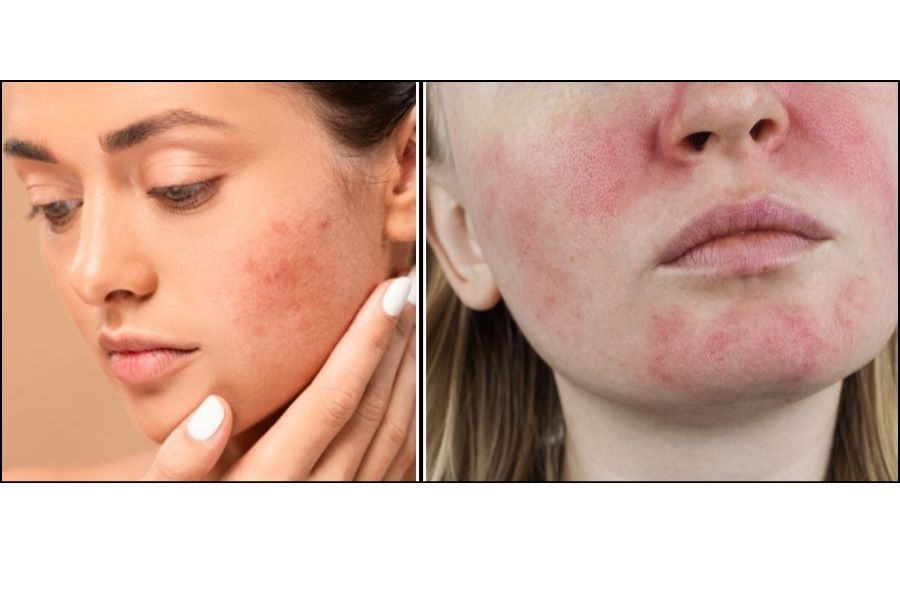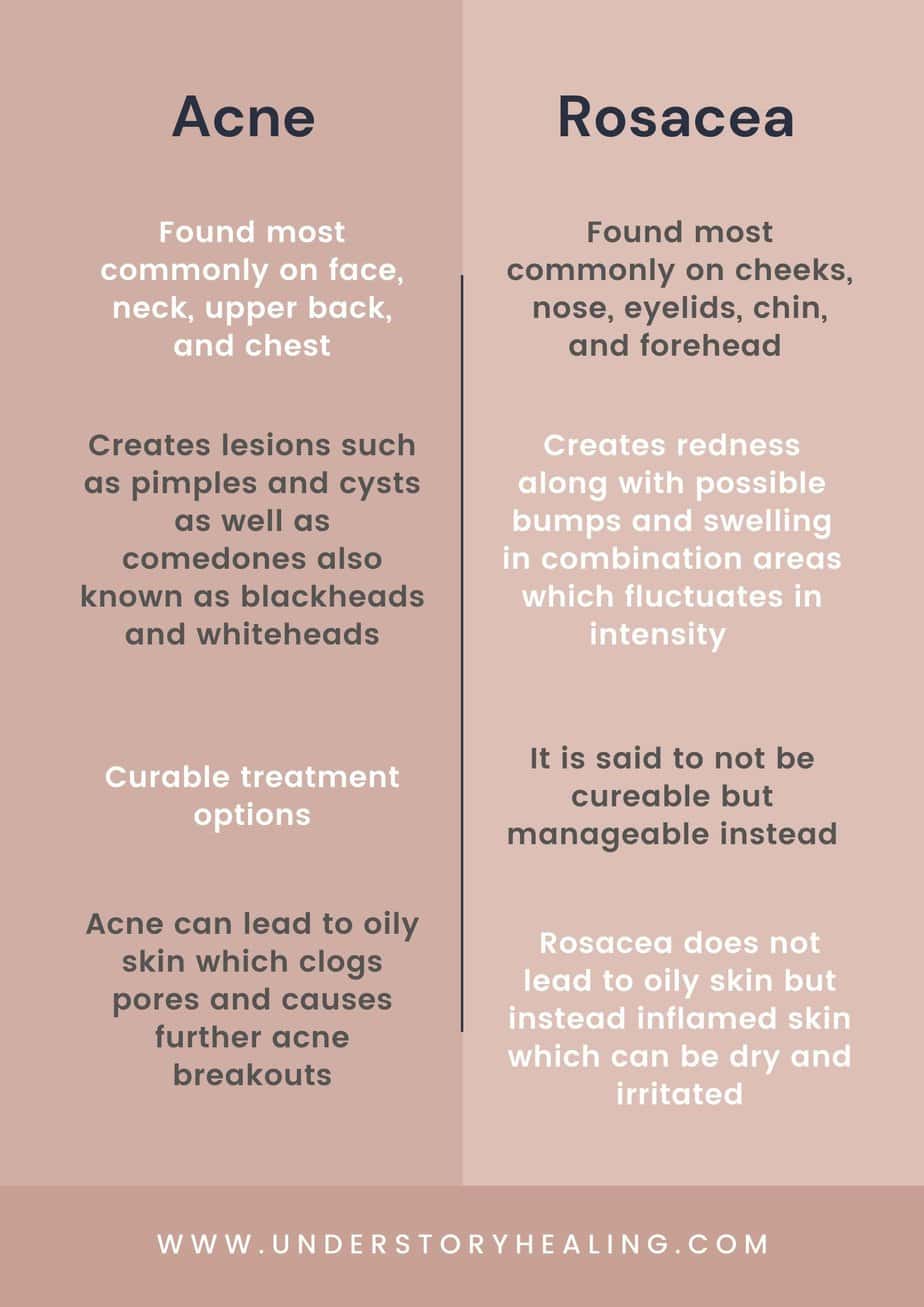Acne Vs Rosacea (Difference, Causes, Treatment)

Some people battle both acne and rosacea daily. Our days are busy. It is difficult to go through each day doing all the tasks that need to get done having a skin condition that can flare up at any time.
We have dealt with both acne and rosacea in our family. Some cases have been worse than others, and I can tell you it is quite the ordeal.
It adds stress and, at times, can be embarrassing. Narrowing down important information regarding both conditions quickly will get you faster results. It will also let you return to all of your other daily responsibilities.
Not only will your skin look better but your body will also be healthier. We know the task can be overwhelming, but it is worth it in the long run.
What is Acne?
Acne, also known as acne vulgaris, is an inflammatory skin condition where lesions (pimples) erupt when the hair follicles (pores) under the skin become blocked by oil and dead skin cells.
There are skin cells called keratinocytes that line the hair follicle. Healthy skin sheds these skin cells. However, when the oil produced by the skin does not bring the keratinocytes to the surface of the skin, the skin becomes inflamed.
Therefore, the skin cells stick to the oil and the hair blocking the pores. This causes the bacteria that naturally live on the skin to become trapped in the plugged follicles causing acne to grow.
The different types of Acne
1. Papules- light-colored, dome-shaped outbreaks on the skin
2. Pastules- Red outbreaks that usually are white at the top and are filled with fluid
3. Nodules- Hard and bigger in size. This type of acne is stuck deeper into the skin
4. Cystic- Deep, painful acne which is irritated and painful to the touch and filled with liquid.
Where Acne Occurs on Body
Acne can appear anywhere on the body. However, there are parts of the body where it is more common to show up. These parts include the face, neck, shoulders and upper back, and even the chest region.
Many times where acne shows up is an indicator of what acne is linked to. For instance, if lesions are present on the bottom part of the face such as the chin or jaw, many times it is linked to hormonal changes.
What triggers Acne
There are different reasons for acne becoming a problem. Figuring out the reason can lead to a quicker solution. It is also important to know that the cause of acne can be defined differently depending on your view.
This means that on the surface acne is caused by either the buildup of skin cells or bacteria in the pore or the overproduction of oil. However, there is another problem that your body can be having that causes or triggers this baseline "cause" to happen.
Getting to the deeper, underlying cause will stop the problems that are causing the acne, if that makes sense. That is why I titled this section What triggers acne instead of what causes acne.
- Hormones- Changes in hormonal activity cause increased production of oil
- Digestive Problems- When the digestive tract is not working properly, there is an imbalance of bacteria in the gut.
- The nerves and blood pathways correspond with one another from the skin to the digestive tract to keep the body working properly. When digestion is out of balance, the proper balance of bacteria on the skin can become imbalanced as well.
- Additionally, there is a certain bacteria known as C. acnes for short that is present in oily skin. This bacteria interacts with the other bacteria on the skin causing inflammation.
- Diet- What you eat affects digestion. This will of course affect the skin as stated above.
- Medications- Medicines can alter the skin microbiome causing acne outbreaks.
- Family History- Genes play a role in how easily one's body can be prone to acne problems.
- Stress- When the body becomes stressed, the immune system is overloaded causing acne.
- Environment/Toxins- An overload of foreign invaders can trigger increased acne problems.
different treatment options for acne
You may consider consulting a dermatologist for treatment options. Before deciding on a treatment option, think about the short-term and long-term effects.
Many dermatologists may recommend the following: antibiotics, tropical medications including Dapsone, Azelaic acid or salicylic acid, creams with retinoids, oral contraceptives, or steroids.
These treatment options will not get to the root of the cause although they may temporarily help the problem or help the problem until the body stabilizes itself. However, it is important that the dermatologist examines all symptoms of the body because some treatment options work better depending on the problem.
How to get rid of acne Naturally
This site of course opts for the natural treatment of acne because it works best with your body's natural chemistry to want to heal itself.
With that being said, some cases of acne are extreme and may benefit from a topical cream that is less invasive to the skin's microbiome until the body can get back to basline. For instance, salicylic acid and retinoids may be a good option if approved by a dermatologist.
The stress that living with acne can cause may make it more difficult for the body to heal. Therefore, decisions should be made according to the individual without negative judgment.
Natural Solutions:
Consulting with an aesthetician is an alternative route. The aesthetician can determine the skin's needs and provide natural options.
This is the route that I took when I had an outbreak of hives and acne. My skin was able to clear up, and my experience was fantastic. Make sure you find an excellent aesthetician to consult like I did.
- Microneedling
- Light Therapy
- Chemical Peel
- Herbal Treatments- topical or oral
- Vitamins
- Diet Changes
Often times acne will heal and disappear over time with a combination of above protocols. This is because the root cause of the body is being addressed. This will stop the overproduction of oil and blockage of pores which cause bacteria buildup.
What is Rosacea?
Rosacea is a chronic inflammatory condition that creates redness on the skin. This redness can appear rash-like. It often fluctuates in occurrence depending on what triggers it.
The factors are unclear as to what exactly causes rosacea. However, environmental and health problems are often linked to symptom outbreaks. Also, these symptoms vary in severity, and they vary in combinations as they appear on the body.
The Different Subtypes of Rosacea
1. Erythematotelangiectatic- This type of rosacea is the hardest to treat. It is characterized by frequent flushing and the visibility of blood vessels.
2. Papulopustular- Rosacea that is characterized by the appearance of redness with acne.
3. Phymatous- Redness can be accompanied by thickened skin that is bumpy or swollen. It is usually located on the cheeks, forehead, eyelids, or the chin.
4. Ocular- Dryness, itching, and tearing with redness around the eyes.
Where Rosacea Occurs on Body
Rosacea is usually isolated to several common body parts which include the cheeks, chin, nose, forehead, and eyelid regions.
Causes and triggers of Rosacea
The exact cause of Rosacea is not known. However, some factors trigger rosacea outbreaks. These vary among individuals and are most likely linked to deeper root causes.
Triggers Include:
- Health conditions involving a compromised immune system
- Diet - sensitivity to spicy food, excess sugar, etc.
- Alcohol
- Caffeine
- Medications
- Certains Cosmetics
- Creams and lotions with harsh chemicals
- Stress
how to get rid of rosacea Naturally
Limiting the above triggers could help rosacea symptoms. Keeping a journal of food and drink intake with reactions or symptoms that occur immediately or up to 3 days after is helpful.
Consulting with a medical specialist is helpful to see if there are underlying conditions triggering rosacea.
Laser treatment is a proven and effective way to reduce rosacea. It helps reduce blood vessels, help with skin texture, and decreases redness.
Microneedling has also been shown to be effective in reducing the physical symptoms of rosacea.
Also, limit the use of lotions and beauty products that contain harmful chemicals.
Another helpful treatment is through an herbal protocol. Using herbs to stabilize and heal autoimmune problems should lessen the occurrence of rosacea.
Lastly, develop a routine that limits stress or adequately addresses stressful situations. This can include meditation, prayer, foot soaks with Epsom salts and magnesium, journaling, mindful walks, massages, etc.
differences between acne and rosacea

Where Should You Begin?
- Consult a specialist or thoroughly research from appropriate sources to determine your condition.
- Keep a journal of daily routine and activities including food and drink intake, products used such as lotions, beauty, soaps, hair products, etc., cleaning supplies used along with the date and time, animal interactions or other allergy-based triggers, etc.
- Label symptoms that occur up to 2-3 days after each day to narrow down what could be possible triggers.
- Once you find a trigger, limit that trigger from your routine for a week to see if you notice an improvement. Only remove 1 possible trigger at a time to accurately assess if that product or item is bothering you.
This post Gives the differences between the inflammatory conditions acne and rosacea including triggers and treatment options.
- Mallikarjun Vasam, Satyanarayana Korutla, Raghvendra Ashok Bohara,
Acne vulgaris: A review of the pathophysiology, treatment, and recent nanotechnology based advances, Biochemistry and Biophysics Reports, Volume 36, 2023, 101578,
2405-5808, https://doi.org/10.1016/j.bbrep.2023.101578. - https://www.niams.nih.gov/health-topics/acne
- https://cdhf.ca/en/acne-and-digestive-health/
- van Zuuren EJ, Arents BWM, van der Linden MMD, Vermeulen S, Fedorowicz Z, Tan J. Rosacea: New Concepts in Classification and Treatment. Am J Clin Dermatol. 2021 Jul;22(4):457-465. doi: 10.1007/s40257-021-00595-7. Epub 2021 Mar 23. PMID: 33759078; PMCID: PMC8200341.
- Rainer, B. M., Kang, S., & Chien, A. L. (2017). Rosacea: Epidemiology, pathogenesis, and treatment. Dermato-Endocrinology, 9(1). https://doi.org/10.1080/19381980.2017.1361574
More Posts To Enjoy
Using the best natural face moisturizer for acne prone skin is important if you suffer from extra-sensitive skin. Breakouts are embarrassing and can be painful. But drying your skin out too much is not good
Cleaning pores thoroughly will create a better complexion and allow the skin to nicely glow like it should. This is especially important if your skin is sensitive to all the elements that touch it or
When itchy and irritated skin is constant, it can make it difficult to focus on the tasks at hand. Using a lotion or cream free of fragrances and unwanted chemicals is important. Using the best
Trying to figure out why your skin is not cooperating? Wondering if your gut health could be part of the problem? Your gut microbiome plays a key role in skin health. Understanding the role the
Have a few imperfections you would like to cover up? Doing it with a clean foundation is the only way to go. We go over the best natural makeup foundation that contains clean ingredients and
Frustrated trying to figure out which organic makeup brand is actually better to buy? You are definitely not alone.Here we give you the best organic makeup brands that are worth the price. Not only do